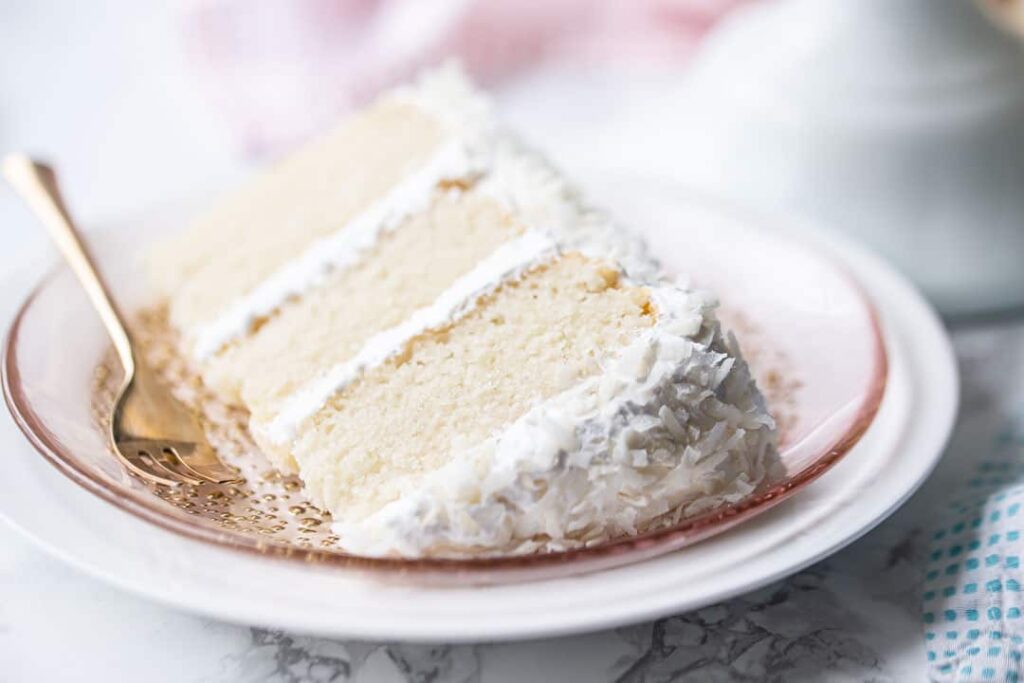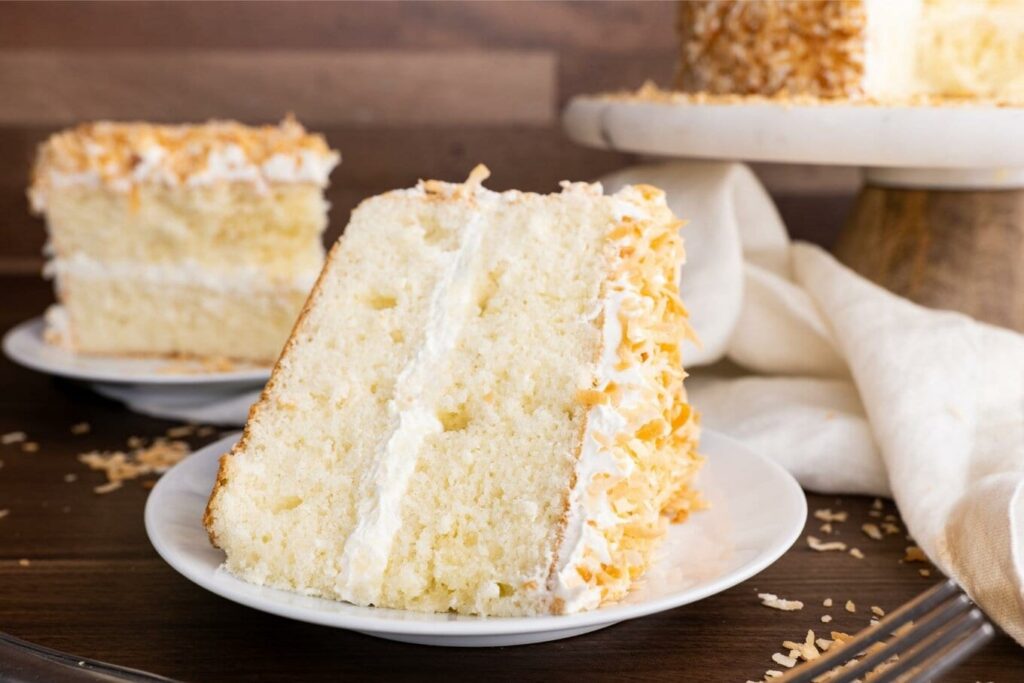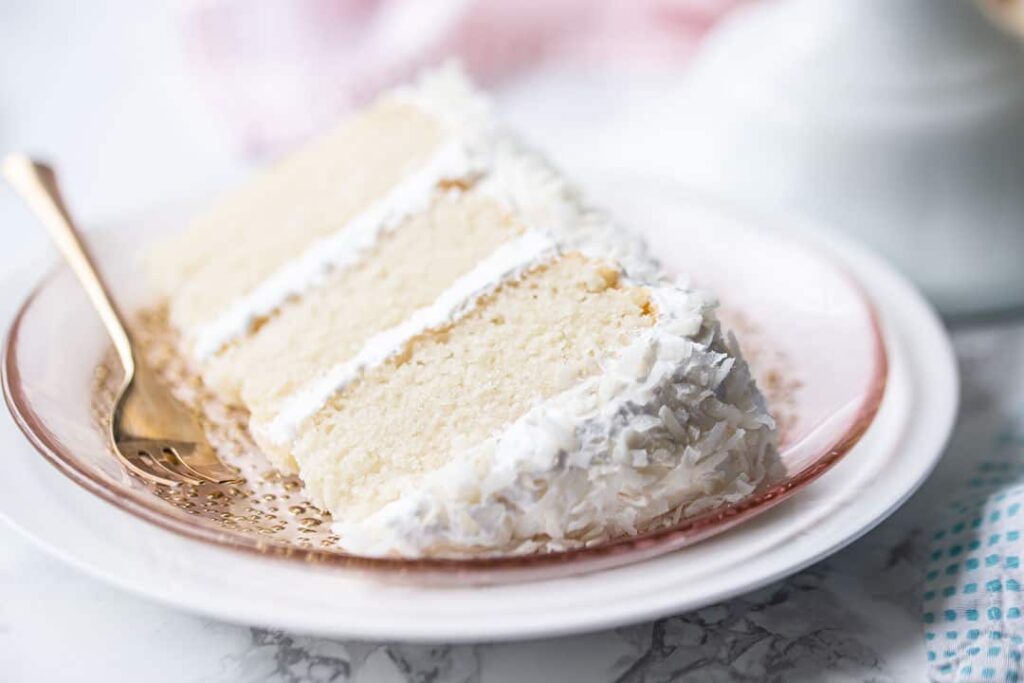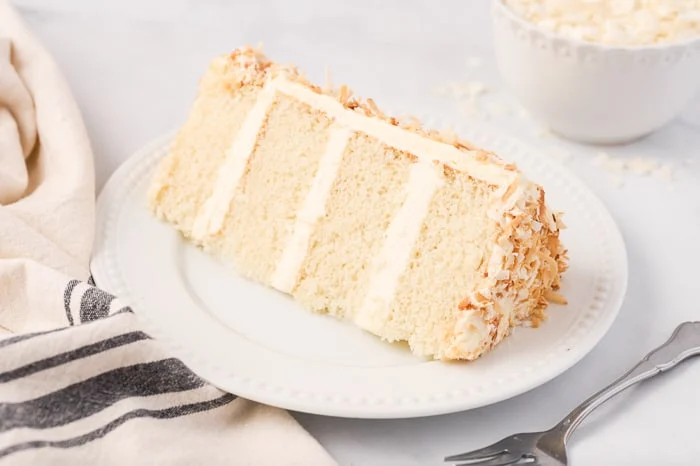Indulging in a slice of classic coconut cake is like taking a delightful trip to the tropical paradise without leaving the comfort of your home.
This iconic dessert has been cherished for generations, offering a perfect blend of moist cake layers, creamy frosting, and the irresistible flavor of coconut.
Join me on a culinary journey as we explore the enchanting world of classic coconut cake and learn why it continues to captivate taste buds around the globe.

The Origins of Coconut Cake
Coconut cake traces its roots back to the tropical regions where coconut trees sway in the warm breeze, offering a bounty of delicious fruits.
While its precise origins are debated, this delectable dessert has become a staple in various cuisines, from the Caribbean islands to Southeast Asia.
The Perfect Cake Base
At the heart of every great coconut cake lies a tender and moist cake base.
Traditional recipes often call for a simple vanilla or coconut-flavored sponge cake, allowing the flavor of coconut to shine through.
With its airy texture and subtle sweetness, the cake serves as the perfect canvas for layers of flavor.
Layers of Flavor
One of the hallmarks of classic coconut cake is its decadent layers of flavor.
Each bite offers a symphony of tastes and textures, from the moist cake layers to the creamy frosting and toasted coconut garnish.
Whether it’s a light and fluffy whipped cream frosting or a rich coconut buttercream, the frosting adds a luscious element to the cake.
Toasted Coconut: The Finishing Touch
No coconut cake is complete without a generous sprinkle of toasted coconut on top.
Toasting the coconut flakes brings out their natural sweetness and adds a delightful crunch to the cake.
It’s the finishing touch that elevates this dessert from ordinary to extraordinary, tantalizing the taste buds with every bite.

Making Memories with Coconut Cake
For many, coconut cake is more than just a dessert—it’s a symbol of celebration and togetherness.
Whether served at weddings, birthdays, or family gatherings, this beloved treat has a way of bringing people together and creating lasting memories.
Sharing a slice of coconut cake with loved ones is a cherished tradition in many cultures, reminding us of the joy found in simple pleasures.
Putting a Twist on Tradition
While classic coconut cake holds a special place in our hearts, there’s no shortage of creative variations to explore.
From adding layers of tangy pineapple to infusing the cake with rum or lime zest, there are endless possibilities for putting a unique twist on this timeless dessert.
Whether you’re a purist or a culinary adventurer, experimenting with different flavors and ingredients can lead to delicious discoveries.
The Versatility of Coconut
Beyond its role in desserts, coconut is a versatile ingredient that adds depth and richness to a wide range of dishes.
From savory curries to tropical cocktails, coconut lends its distinctive flavor and creamy texture to countless recipes.
Whether you’re craving something sweet or savory, coconut is sure to inspire culinary creativity in the kitchen.
Conclusion:
In conclusion, classic coconut cake is more than just a dessert—it’s a celebration of the tropical flavors and timeless traditions that bring joy to our lives.
From its humble origins to its enduring popularity, this iconic dessert continues to enchant and delight food lovers around the world.
So why not treat yourself to a slice of coconut cake and savor a taste of the tropics wherever you are?

FAQs:
Q1: Can I use desiccated coconut instead of fresh coconut in coconut cake?
A1: Absolutely! Desiccated coconut is a convenient alternative that works well in coconut cake recipes, providing the same delicious flavor and texture.
Q2: How do I prevent my coconut cake from drying out?
A2: To keep your coconut cake moist, be sure not to overbake it.
Additionally, wrapping the cake layers tightly in plastic wrap or storing them in an airtight container can help retain moisture.
Q3: Can I make coconut cake ahead of time?
A3: Yes, coconut cake can be made ahead of time and stored in the refrigerator for several days.
Just be sure to wrap it tightly to prevent it from drying out.
Q4: Can I freeze coconut cake?
A4: Absolutely! Coconut cake freezes well, especially when wrapped tightly in plastic wrap and aluminum foil.
Just thaw it in the refrigerator overnight before serving.
Q5: Can I use coconut milk instead of regular milk in coconut cake?
A5: Yes, coconut milk can be used as a delicious dairy-free alternative in coconut cake recipes, adding extra coconut flavor to the batter.
